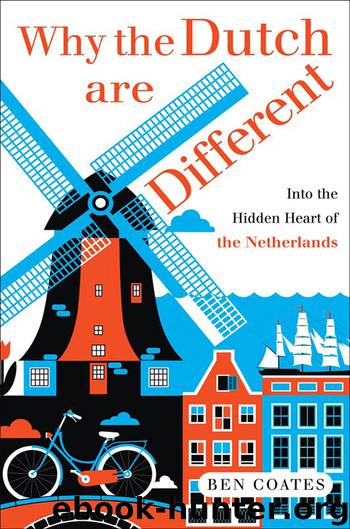Why the Dutch are Different by Ben Coates

Author:Ben Coates
Language: eng
Format: epub
Publisher: Quercus
Published: 2015-03-21T16:00:00+00:00
The Hunger Winter
Even for those who avoided being sent to Camp Westerbork, life in the occupied Netherlands was grim. Rotterdam, which had suffered heavy bombing raids at the hands of the invading Nazis, now had to endure further raids from the allies seeking to liberate the city. British and American bombers visited well over a hundred times, bearing gifts that destroyed further swathes of the city and left thousands homeless.
In Amsterdam, the young girl with the diary, Anne Frank, had moved with her family into a secret annexe hidden behind a bookcase in her father’s office building. They would stay there for more than two years, during which time she wrote diligently about the miseries of life in hiding and the experience of growing from a girl into a woman. In August 1944, the Franks were betrayed and arrested. The family feared for their lives, but for Anne even the train journey to Camp Westerbork was a source of interest: after years trapped indoors, she couldn’t tear herself away from the windows offering views of meadows and forests. At the camp the Franks were assigned to barracks and set to work breaking old batteries apart with hammers and chisels. On 2 September, the camp authorities read out the names of the next thousand people to be sent to Auschwitz, including the eight former inhabitants of the secret annexe. Only Anne’s father Otto survived.
By mid-1944, the tide had turned against the Nazis. In the space of a few months, the allies liberated Rome, landed at Normandy on D-Day and captured Paris. In early September, Brussels and Antwerp were liberated and the Dutch Prime Minister, Pieter Gerbrandy, mistakenly announced that the liberation of the Netherlands was already underway. Scores of people rushed to the outskirts of Rotterdam carrying bunches of flowers to throw to their saviours, but Gerbrandy (known to Churchill as ‘Mr Cherry Brandy’) was mistaken. A group of ‘liberators’ spotted in Breda turned out to be a British patrol who had crossed the border by accident. In September, an attempt by British parachute troops to capture a key bridge over the river Rhine at Arnhem – Operation Market Garden – ended in ignominious defeat, the crossing proving to be the famous ‘Bridge too Far’. Asked by Gerbrandy if the Netherlands would be free by October, a senior US military officer replied with a single word: ‘impossible’.
The Germans, however, were already preparing for defeat. Scores of Nazi soldiers fled the Netherlands, often taking with them whatever they could carry. One witness reported the scene at Amsterdam Central Station as looters stacked ‘all sorts of things; furniture, desks, typewriters, stoves, even chicken coops with and without chickens’. In the eastern city of Arnhem, one resident told of finding a note requesting the theft to order of a dinner set and Persian carpet, ‘as if the place was a department store’. By the end of the war, the Red Cross had recorded the theft or destruction of 30,000 beds, 20,000 cooking stoves, 60,000 chairs and 80,000 blankets in the city of Arnhem alone.
Download
This site does not store any files on its server. We only index and link to content provided by other sites. Please contact the content providers to delete copyright contents if any and email us, we'll remove relevant links or contents immediately.
Asking the Right Questions: A Guide to Critical Thinking by M. Neil Browne & Stuart M. Keeley(5775)
Autoboyography by Christina Lauren(5235)
Eat That Frog! by Brian Tracy(4540)
Dialogue by Robert McKee(4405)
Sticky Fingers by Joe Hagan(4199)
Journeys Out of the Body by Robert Monroe(3624)
Annapurna by Maurice Herzog(3468)
Full Circle by Michael Palin(3450)
Schaum's Quick Guide to Writing Great Short Stories by Margaret Lucke(3381)
Elements of Style 2017 by Richard De A'Morelli(3350)
The Art of Dramatic Writing: Its Basis in the Creative Interpretation of Human Motives by Egri Lajos(3068)
Atlas Obscura by Joshua Foer(2962)
Why I Write by George Orwell(2955)
The Fight by Norman Mailer(2942)
The Diviners by Libba Bray(2938)
In Patagonia by Bruce Chatwin(2932)
The Mental Game of Writing: How to Overcome Obstacles, Stay Creative and Productive, and Free Your Mind for Success by James Scott Bell(2909)
Venice by Jan Morris(2574)
The Elements of Style by William Strunk and E. B. White(2473)
